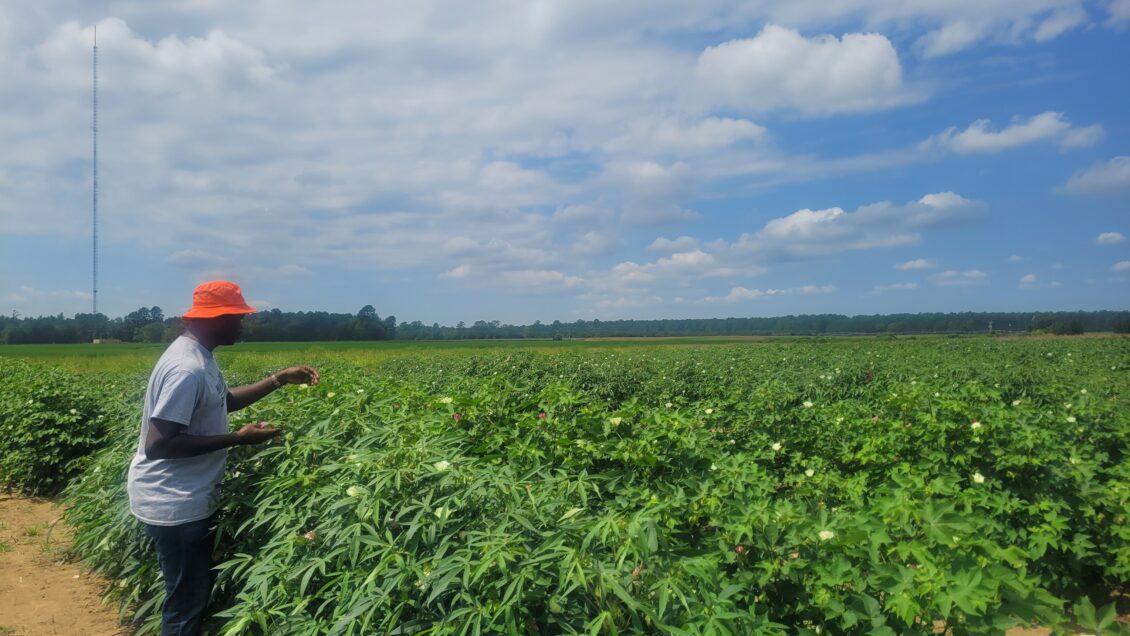
Lint has been the focus of cotton research and breeding efforts for centuries, but Clemson University and Cotton Incorporated researchers believe now is the time to look a little closer at the benefits of cottonseed oil.
Christopher Saski, an associate professor of systems genetics in Clemson’s Plant and Environmental Sciences Department, and Don Jones of Cotton Incorporated, have received a grant from the United States Department of Agriculture to use molecular tools and unique plant germplasm to understand and improve the genetics underlying oil content in upland cotton.
“Our vision is to develop a joint fiber and seed cotton production system to maximize the value of both lint and seed,” Saski said. “This project will deliver solutions to cotton stakeholders’ requests to increase the value of the cotton crop to make farming operations more profitable, resilient and sustainable.”
During this study, the researchers plan to develop germplasm with high cottonseed oil content and genetic resistance to Fusarium oxysporum, vasinfectum race 4 (FOV4), which causes fusarium wilt of cotton. Fusarium wilt is the number one disease threat to upland cotton.
In addition to developing new germplasm, the researchers also will work to validate candidate-resistant genes in upland cotton, determine molecular markers to predict and track FOV resistance in breeding programs, create a foundation for international collaboration and develop interdisciplinary training for postdoctoral scientists and graduate students.
“Using cutting-edge research and collaboration, we will empower breeders with the tools and knowledge they need to optimize cotton production for growers, thus helping secure the future of this vital crop,” Saski said. “We also will invest in the training of the next generation of interdisciplinary plant scientists with knowledge of genetics, genomics, bioinformatics and biotechnology to deepen understanding of cotton’s plant biology.
“This is critical as growers face new challenges from a changing climate and a growing global population.”
The researchers want to ensure the new cottonseed has improved nutritional benefits in its oil. Foster Kangben, a doctoral student from Ghana who is a Fulbright Scholar and is working with Saski on the project, said improved oil content is an added incentive for cotton production.
“For growers, cultivating high oil-content cotton varieties can prove to be a lucrative venture, offering an additional incentive alongside fiber production,” Kangben said. “As for consumers, cotton oil could emerge as a favorable alternative to other types of cooking oils, especially for culinary applications, offering not only its unique properties for cooking but also potential health benefits.”
Cottonseed oil has been in use for over a century as a source of edible oil and biodiesel because of its high content of unsaturated fatty acids. It also is used as a cooking oil in marinades, dressings, pastries, margarine and shortenings.
It is a stable oil compared to other cooking oils because of its long shelf life. Cottonseed oil also has a high smoke point and it does not “mask” the taste of foods, making it ideal for multi-purpose frying.
Humans can benefit from eating cottonseed oil. Studies have shown that the short-term consumption of a diet rich in cottonseed oil lowers total and LDL (bad) cholesterol because this oil contains fatty acids such as palmitic, stearic, oleic, linoleic and linolenic.
Aside from culinary and human health-related uses, cottonseed oil also has potential as a renewable alternative fuel source to petroleum-based fuels. Vegetable oils have been shown to offer similar output with slightly lower thermal efficiency when used in diesel engines. Studies have shown that various blends of cottonseed oil had a substantial reduction in carbon monoxide emission in conjunction with improved heat release characteristics.
During this study, the researchers will seek to identify the genetic basis of oil and protein traits in cottonseed. Clemson’s high-performance computing resource, the Palmetto Cluster, will be used to perform genetic analyses to determine various cottonseed oil traits.
The study will be planted in six field locations – South Carolina, Arkansas, Mississippi, North Carolina, Georgia and Arizona – over two years to collect data on how the environment influences oil traits.
Developing cottonseed with improved oil content and genetic resistance to FOV4 will help ensure South Carolina cotton growers get an increased income based on lint yield and a “newly enhanced byproduct” in cottonseed oil, Jones said, adding collaborating with Saski on this project was an easy decision to make.
“I am working with Dr. Saski based on his proven record of delivering solutions to grower problems,” Jones said. “For example, he leads a private/public sector partnership that, in four short years, identified resistant germplasm to the devastating pathogen, FOV4. In doing so he and his team also discovered the causative genes for the resistance and how that defense mechanism works. Using the same genetic resources – which is very cost-effective – he will employ the same process to uncover genes which control oil content in cottonseed.”
-END-
Cotton Facts
United States paper currency is a blend of 75% cotton lint and 25% linen.
Cotton is a member of the Mallow family of plants.
The Arabic people called it “Qutum” which is where the word “Cotton” comes from.
Between 1920 and 1922 , the Boll Weevil caused cotton production in South Carolina to drop 70%.
Source: South Carolina Cotton Museum
http://www.sccotton.org/
Get in touch and we will connect you with the author or another expert.
Or email us at news@clemson.edu
